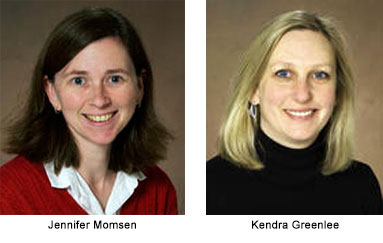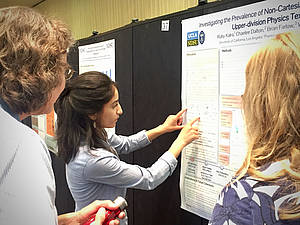Research Experiences for Undergrads (REUs) offer undergraduates the opportunity to work closely with faculty and graduate students within an established research program and typically receive stipends and assistance with housing and travel. Two examples at NDSU are Growing Up Stem and Pollination Nation.

Growing Up Stem
Collaborations in Discipline-based Education Research (CiDER) is a partnership among NDSU faculty who engage in discipline-based education research at the undergraduate level in biology, chemistry, computer science, math, microbiology, psychology, and physics. Through two NSF grants (and a third in process), associate professors Jenni Momsen (biological sciences) and Warren Christensen (physics) have developed and implemented an undergraduate research experience in STEM education. Entitled Growing Up STEM, the program is entering its seventh year and hosts 10 students annually. As one of the first REU programs in the nation focused on STEM Education, Growing Up Stem seeks to create a community of scholars focused on STEM education research by engaging undergraduate students from across the nation in cutting-edge, collaborative, interdisciplinary research investigating learning in STEM disciplines.
Momsen commented that a primary goal of the REU is to, “Help students learn about the process of research, from idea generation to presenting the results of their research to learning how to collaborate with a wide variety of individuals.” She knows firsthand about the value of undergraduate research experiences as she was a participant in an REU program herself. “It was my first experience doing independent research and I remember being both terrified and energized. I was asking questions that no one knew the answer to, which really sparked in me a drive to continue along that pathway.”
 The program features projects from across a wide spectrum of STEM education concepts including socio-scientific issues students face; machine learning strategies; blending service learning with science; effectiveness of flipped learning; and how sustainable “green” chemistry concepts can be introduced.
The program features projects from across a wide spectrum of STEM education concepts including socio-scientific issues students face; machine learning strategies; blending service learning with science; effectiveness of flipped learning; and how sustainable “green” chemistry concepts can be introduced.
When she had the chance to lead a STEM education program, Momsen knew the impact that creating an REU Site for STEM Education could have. “Six years later, I love our program. One student told me that the program gave them a better sense of what research is and how it made it a realistic career possibility for them. Other students say that the program helps them see themselves as scientists for the first time, and many report changing their career goals as a result of participating in it.”
Pollination Nation
Biology associate professors Kendra Greenlee and Julia Bowsher are co-PIs for Pollination Nation. The 10 week REU is conducted by NDSU and USDA scientists through the Insect Cryobiology and Ecophysiology Network (ICE). Pollination Nation allows participants to conduct research focused on understanding overwintering and pollinator health using molecular biology, field ecology, and genomics techniques.
Pollination Nation has run since 2015 and 34 students have participated during that period. While the REU focuses primarily on the important work of pollinator health and research, Greenlee notes that it also helps students understand the scientific process and the basics of professional development. “We discuss how to start a career in research,” she said. “That includes how to apply to graduate school, the tools they need to develop to be successful, and the ethics required to be a successful researcher.”
In addition, Pollination Nation participants are taught science communication skills. “Because we believe that effective science communication is so important, we work with students on how to best deliver their ideas to the public,” adds Greenlee. “Through experiences with chalk talks and a full poster session, we get the students thinking about the communication skills they’ll need later in their careers. In addition to learning the scientific process and how to communicate it in this REU, Greenlee and Bowsher also stress the importance of opening up the process of finding jobs in an agency like the USDA. They provide their students with access to many USDA professionals and current grad students during the REU.
 Like Momsen, Greenlee’s early research experiences taught her the values she instills in her students. Working as a National Forest Service employee radio tracking bats, she learned how the manner in which a scientist approaches their work will impact the research. “One of the most important aspects of a researcher is a positive attitude. Science doesn’t always go how you expect. You need to be open to the science and go with its flow.” From the first day of her REU, she tells students that those who learn this and contribute will excel. In addition, she creates mentors of her graduate students by teaching effective mentorship management. Before REU attendees even arrive, her graduate students and faculty have developed and assigned projects for them.
Like Momsen, Greenlee’s early research experiences taught her the values she instills in her students. Working as a National Forest Service employee radio tracking bats, she learned how the manner in which a scientist approaches their work will impact the research. “One of the most important aspects of a researcher is a positive attitude. Science doesn’t always go how you expect. You need to be open to the science and go with its flow.” From the first day of her REU, she tells students that those who learn this and contribute will excel. In addition, she creates mentors of her graduate students by teaching effective mentorship management. Before REU attendees even arrive, her graduate students and faculty have developed and assigned projects for them.
Elisabeth Wilson, a past attendee of Pollination Nation, was so impressed with the program that she chose NDSU for her graduate studies. The winner of the 2019 Three Minute Thesis competition at NDSU, Wilson’s research in the Insect Cryobiology and Ecophysiology (ICE) Research Unit involves mortality rates of alfalfa cutter bees, which are an important pollinator in North America and Canada. “My experience in the Pollination Nation REU program introduced me to working with pollinators and NDSU. Without the REU opportunity I never would have found NDSU or the joy of working in agricultural research.”
Both Momsen and Greenlee are believers in helping undergraduates discover research. Momsen sums it up, “Undergraduate research is such a phenomenal opportunity for students to really dive into the process of science. You learn so much more than the science, you learn how to learn, how to ask and answer questions, and you really gain a confidence in yourself as a scientist.” Greenlee adds, “We run our summer research to train scientists because the world just needs more scientists.”
To learn more about Growing Up Stem and Pollination Nation, visit:
To learn more about the NSF REU program and review the current solicitation, visit:
As a student-focused, land-grant, research university, we serve our citizens.


